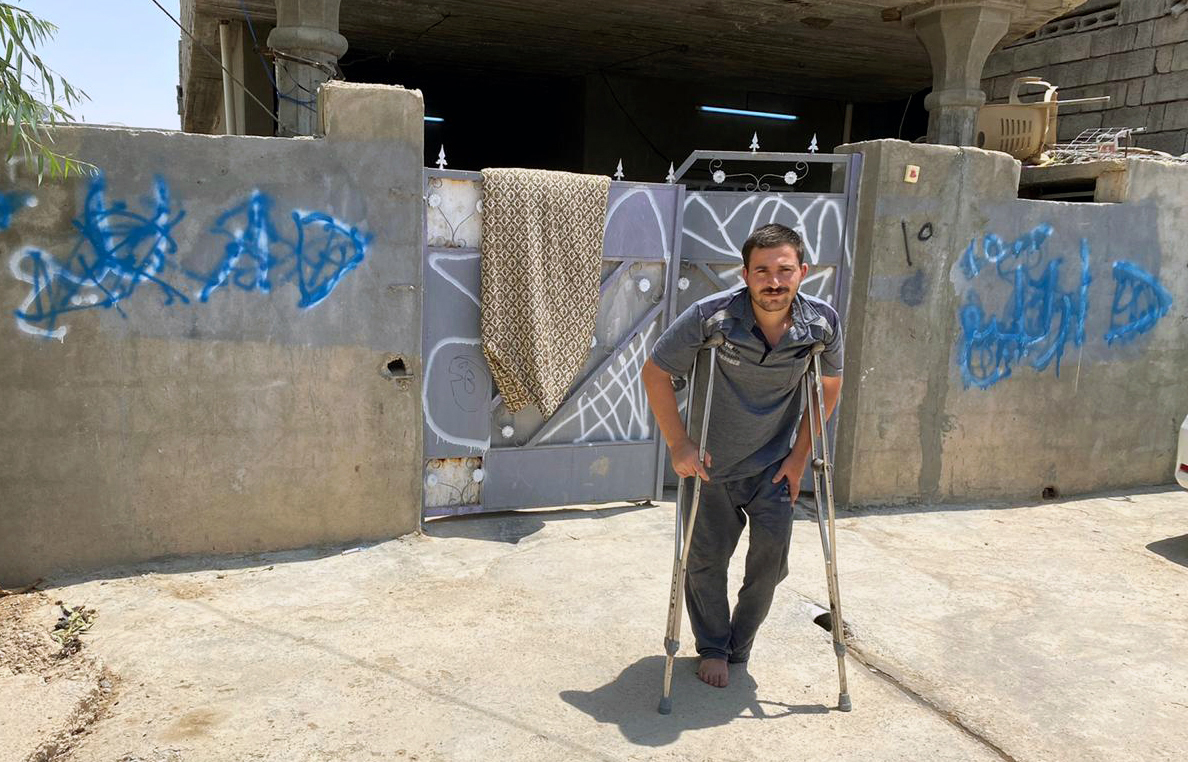Every night Almas’ sleep is disrupted by the pain caused by the injuries in his back and his dysfunctioning leg, as he neither has painkillers, nor can he travel to towns and cities to see doctors.
There are many scars on the body of this Kaka’i youth; several vertebrae in his spine have been replaced and his left leg is impaired from the knee down.
27-year-old Almas Aziz has lived with agony for nearly six years, but he hasn’t been as desperate as he is now, as the COVID-19 and its consequence lockdown have taken almost all the hope he can muster now.
“I live with severe psychological distress, especially now that I have nowhere to turn to due to the Coronavirus. All that is left for me is pain and poverty,” said Almas to KirkukNow.
Almas lives in a slum called Ashti in Daquq Subdistrict, 44 km south of Kirkuk City. He is registered as a ‘person with disabilities’ at the Ministry of Peshmerga of Kurdistan Regional Government (KRG). At the start of the ISIS war, mid-2014, he was severely injured at the Turkmen-majority village of Bashir (about 20 km south-west of Kirkuk City).
The pain in my foot keeps me awake all night
“The pain in my foot keeps me awake all night. I have become a burden on my mother and my wife,” said Almas.
Almas is in need of long-term medical care. Before the COVID-19 outbreak, he would receive his medicines at a public hospital, but that has changed several months ago, as most of the hospitals and medical centres are occupied with dealing with the outbreak.
Most of the medicine he was getting, were painkillers to remedy the pain in his foot and other injuries on his body.
“For the pain in my foot I [would] take Tramadol, which costs 30,000 IQD [$25.30] in the market, if one can find it. Without it, I can’t sleep due to the pain.”
Like every injured Peshmerga veteran from the ISIS war, Almas receives a month salary per two months. Due to the financial crisis and low oil prices, KRG is unable to pay full salaries and on time.
According to official numbers from KRG’s Ministry of Peshmerga, more than 1,600 Peshmerga soldiers were killed and more than 10,000 were injured in the ISIS war.
After he got wounded, Almas was sent abroad by the Ministry of Peshmerga for an operation to replace eight vertebrae in his spine. But his left foot is still not amputated, despite being empaired.
Due to the curfew, I can’t travel to Erbil to see my psychiatrist
“Due to the curfew, I can’t travel to Erbil to see my psychiatrist, whom I have to see once a week,” said Almas.
In an attempt to halt the Coronavirus outbreak, the central government in Baghdad and KRG have both banned travelling between all provinces since March.
Almas has a wife and a child, and his mother lives with them. They all live in an unfinished building without an official deed.
His mother, Najma Tameen, was a tailor working from home before the COVID-19 outbreak. But nowadays she has no customers, which makes it harder for them to get by financially.
“We live in very bad conditions nowadays; the Coronavirus has brought catastrophe upon us.”
To help alleviate his son’s pain, Najma visits all the hospitals and medical centres in Daquq on a daily basis, hoping to find some Tramadol.
“What else can I do? If I don’t do that, who will help him? It kills me when I see him suffer such pain.”
Sobbing, Najma explained her daily ordeal to KirkukNow: “Not a place left I haven’t been, not a door I haven’t knocked… I think people have had enough of me.”
Her only wish is for her son to get a permanent cure, so he won’t suffer the pain any more.
All that we can do now is pray and ask for God’s mercy
“All that we can do now is pray and ask for God’s mercy,” said Najma.
Najma and her son Almas are sking for help - Video by KirkukNow
The measures taken against the COVID-19 outbreak have harmed the Kakayis in Daquq immensely: from the increase of crime rate as security personnel tasked with enforcing the measures, the dead stop of agriculture and market activities, to treatment deprivation for people like Almas.
Almas uses two crutches to be able to walk. He spends most of his time pacing the courtyard of their house and the street on which it is located. He is mentaly exhausted from brooding about his injuries and his pain. “I have come to a point that I am willing to let my foot be amputated without anaesthetics,” said Almas.





